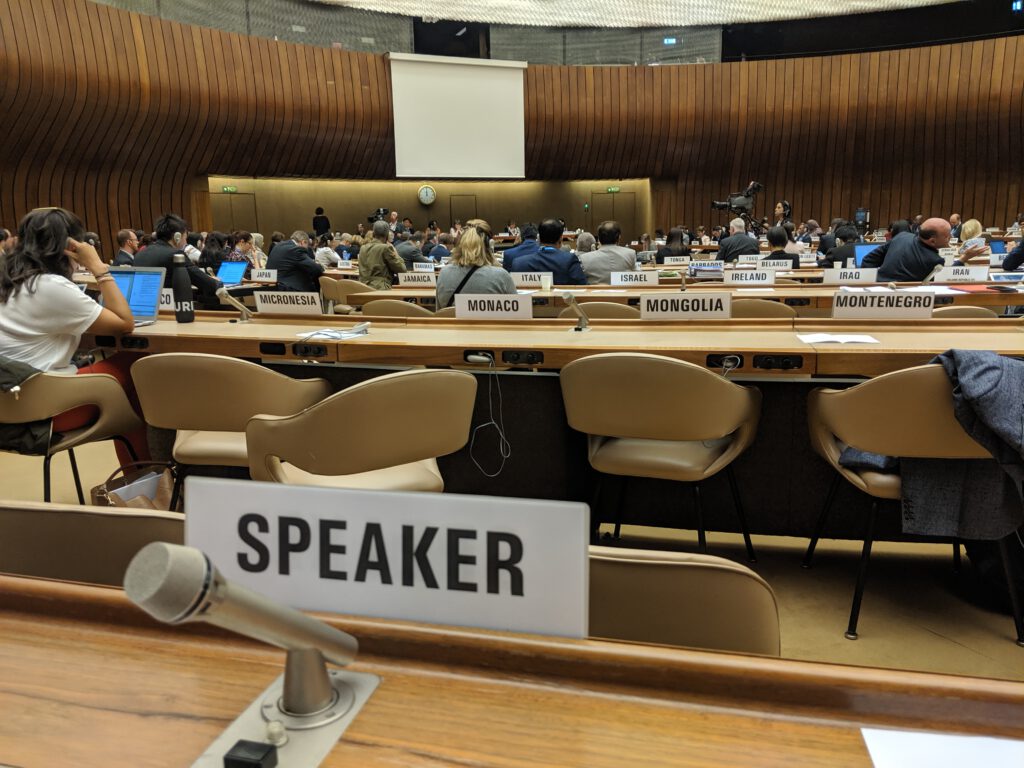Highlighting the Important Role of WASH in Healthcare Facilities at WHA

A view of the World Health Assembly. Photo credit: Lindsay Denny/Global Water 2020
This year’s World Health Assembly highlighted a key issue long overlooked by the global health community – the lack of water, sanitation and hygiene (WASH) in healthcare facilities (HCF). Data from a recent WHO/UNICEF report found that 2 billion people visit healthcare facilities without basic water service, while 1.5 billion people visit facilities with no sanitation.
In response, WHO Member States adopted a resolution to improve WASH in healthcare facilities. Originally co-sponsored by 11 countries including the US, the resolution demonstrates the links between WASH in healthcare facilities to other key health initiatives, urges Member States to take specific actions, invites partners to provide support, and requests guidance and oversight from WHO.
Member States came together and unanimously recognized the significance of this neglected issue. During the deliberations, 34 countries gave strong statements in support of the resolution, as did eight non-state actors that included WaterAid, World Vision and Global Health Council. No amendments were recommended – only urgency and support was voiced.
Notable policy and implementation efforts discussed include:
- Multisectoral coordination among state players, as well as the integration of WASH in health initiatives such as maternal and newborn health, quality care, and antimicrobial resistance programs.
- National health policies, strategies, and plans to promote better hygiene and implement WASH services in HCF. These plans can offer a concrete framework for other countries to follow.
- Addressing the contributing factor of the urban-rural divide, in context of WASH in HCF, particularly as it relates to poor sanitation.
- The development of national WASH standards was stressed by many countries as necessary for unifying the global effort aimed at this issue (AFRO Region, SEARO Region, Maldives).
- Infrastructure indicators for WASH in HCF. Similar to having WASH standards, this was noted as necessary for unifying a global approach to this issue.
- Improvements to data collection within HCF, and the importance of more data to better understand and address the current status of WASH in HCF.
- Low-cost measures and solutions (e.g., increased availability of waste bins, toilet construction initiatives, etc.) as viable options for improving WASH services.
- Improvements to training and monitoring programs and sustainable infrastructure as a low-cost solution for improving WASH in HCF.
In addition to the resolution, a Member State side event on WASH in healthcare facilities hosted by Zambia, Tanzania, Eswatini, Japan, Sweden and Germany brought together dozens of countries, WHO staff, and non-state actors around the issue. Director-General Dr. Tedros Adhanom Ghebreyesus best described the urgent need to address the issue, saying “if you can’t do the basics, forget the rest. Prevention, prevention, prevention.”
This resolution offers a rare opportunity to elevate the issue of WASH in healthcare facilities and guide action at the national and sub-national levels. On the global stage, it provides further credibility and justification for embedding WASH into key health issues such as UHC, quality of care and AMR, continuing the momentum drawn from the UN Secretary-General’s Call to Action for WASH in Healthcare Facilities in 2018. It is a solid foundation for the multitude of activities that need to happen to ensure we reach the 2030 goal of universal WASH coverage in healthcare facilities.
This post was written by Lindsay Denny, Health Adviser, Global Water 2020. Global Water 2020 is a three-year advocacy and facilitation initiative designed to accelerate progress toward water access and security for all people in developing countries. They focus on the lack of safe drinking water, sanitation, and hygiene (WASH) in health-care facilities worldwide; and global and regional water diplomacy in the Middle East and beyond. Global Water 2020 designs their efforts both to help address gaps in the global water sector, and to prevent water imbalances from causing or magnifying security threats including conflict, famines, and infectious disease pandemics.